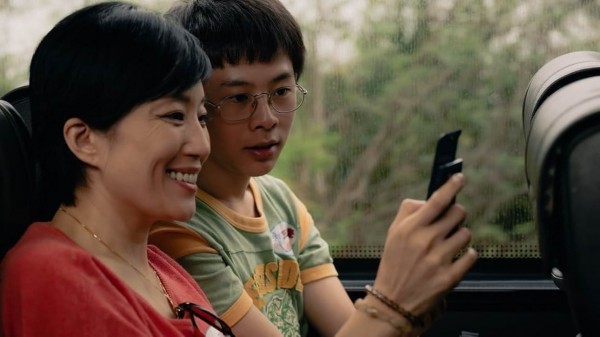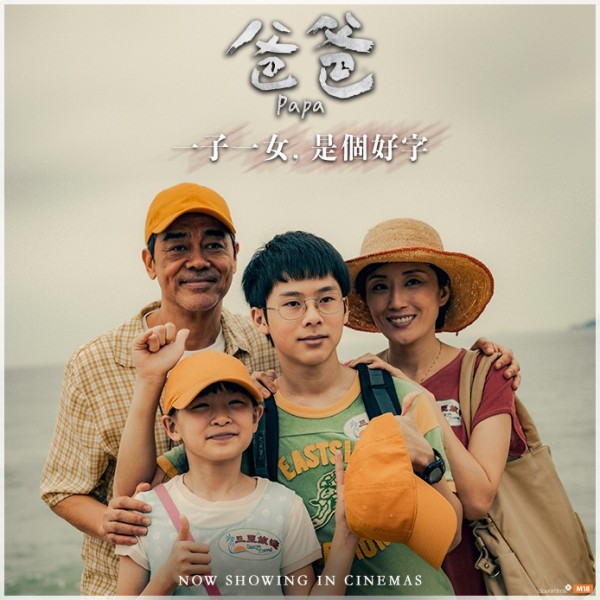 JO KOO AND DYLAN SO IN PAPA PHILIP YUNG: PAPA 爸爸 (2024) New York Asian Film Festival 2025TEASERThe calm complexities of a life, even marked by a horrific event
JO KOO AND DYLAN SO IN PAPA PHILIP YUNG: PAPA 爸爸 (2024) New York Asian Film Festival 2025TEASERThe calm complexities of a life, even marked by a horrific event "Inspired by true events," this haunting, complex, low-keyed Hong Kong portrait of a father with the patience of Job never asks whether the fifteen-year-old son Ming (Dylan So) who kills his young, beautiful wife Yin (Jo Koo) and their younger daughter Grace (Lainey Hung) with a meat cleaver, whether he is still worthy of his love. He only has to find a way. The film moves around in time, introducing the horrific event at the outset but not actually glimpsing it till much later, going back over earlier events like the man ruminating. As he seeks to understand we also try to. It's an approach that may lose some in the audience but that, with sympathy, may move closer to human thought and feeling than usual, away from drama and cheap effects toward everyday experience and the subtlety of a novel, or a suite of novels.
A unifying element is the 24/7 Hong Kong style cafe diner the couple start and jointly run. The wife was pretty and younger, Yuen (Sean Lau, in a remarkable performance) having decided to marry later than other members of his generation and his friends, but Yin is fully on board with it, and the affair has the feel of romance. None more so than when they wed, and their karaoke lark that same day, a moment he comes back to repeatedly.
Ming, the son, is judged to be mentally ill and after a trial is sent to a kind of psyciatric prison, though one that seemingly considers his release after only four years. We look in on the son much earlier when he is an ordinary and cheerful smaller boy. As a young teen he seems no different, quiet, bespectacled, curious, calm. What the family does not know is that he has been hearing voices telling him that overpopulation is causing the glaciers to melt and he kills the two people closest at hand to lower it. He goes out bloody and tries to add to the reduction by strangling someone on the street, but he isn't strong enough. He goes to a park and sitting there, calls 999 and reports that he has killed someone. We see him arrested there later.
You can say that the scenes here are sliced and diced, but it's all in the editing, which uses fragmented chronology to recreate a sensibility and a tormented awareness. The essence of this film is in the editing.
There is detail later about Ming's treatment at the psychiatric facility, and his responding well to medication. We get a feeling of Yin. It's a family of four and it seems a good humored family, no yelling, no pouting, as when Ming asks for a new cell phone that takes photographs and his father objects that multi-function gadgets are no bood and offers to buy him a camera, and he just says, "Never mind." This scene evokes a "memory" we have from Yuen's earlier days, in a camera shop when he buys a new digital camera and is excited about what it can do. But there are a number of ticketed chapters here, and even a chapter of the family cat, Carnation, who is what Ming takes most snaps of whe he gets a phone with a camera.
Later Papa reminds the boy, who has forgotten, that a snap of the four of them was done with a timer, because it was a digital camera. All these memories, all these interconnectons, as in a sensiboility, as in a life. But foremost remains the event from the pages of the Hong Kong press, an event that stunned the city and marks this man -- because this film is first of all about him, "Papa," of a family that is no more, destroyed by the son in a few minutes one night when he, he is saved perhaps, because he is where he so often is, at the cafe, working, when it happens. For Yuen there is always the question of why, why did you do this? Even though the boy gives that explanation, it remains incomprehensible. Later he will learn to say the mental illness did it. And then at another time, Yuen is trying to reconcile with the boy (to restore that little part of the family that remains), and asks that they not talk about that event at all now.
At the same time we also experience the deaths. We see the choosing of the coffins (Yuen asks if wife and daughter can be buried in the same one: they cannot), the funeral, meeting with friends and relatives and what the undertaker tells him it is and is not proper to say to visiting mourners (not "thank you," not "see you later").
Meanwhile Yuen, who is a "typical" inarticulate Hong Kong man who has little to say at any time, and makes no dramatic declarations after the murders, nonetheless is full of self-recriminaton at times for himself. And yet also his inarticulateness sometimes may be the best approach, and the most touching. He must recognize that his invovement with the 24/7 cafe makes him not the most hands-on of fathers. He might consider, though this is not mentioned, that they, he and his wife, might have recognized signs of something strange in their son, and had it looked to. But if your son is smart, bookish, intellectual, and withdrawn, do you suspect he's schizophrenic? You do not. Nonetheless the wish that things had gone differently causes the man to ruminate wistfully, and this is a governing principle of the many flashbacks. Yet they are also a neutral picture of events, not a fantasy retelling of them to suit an idea.
Yuen's stoicism breaks in a memorable scene after the tragedy when he hires an escort and then is robbed by her employers before anything happens. It is here unexpectedly that he gives in and is destroyed with prolongued weeping as guilt, regret, shame, and all the feelings bottled up in him come out.
Much of the film is fascinating and compulsively watchable as it slips imperceptibly and pleasureably around among present and past events. It seems to be finding too easy solutions sometimes in the latter segment, which is also marred by switching to another actor to play the more grownup Ming. But one can see why this has gotten a lot of attetion, including a review in
Hollywood Reporter by Jordan Mintzer and one in
Variety by Richard Kuipers. I was also impressed by the citizen review by Ong Chenghan in Letterboxd that calls the film " a profound journey of inner healing" that tells "a story about responsibility, loss and forgiveness in an extremely restrained and gentle way, allowing people to slowly understand the true appearance of 'love' between silence and recollection": this gets at some of the complexity of this great film for director Philip Yung and for the cast, especially lead actor Sean Lau.
Wikipedia.
Papa 爸爸 131 mins., premiered at Tokyo Oct. 31, 2024, also shown at Hong Kong and Udine. Screened for this review as part of the NYAFF (July 11-27 2025).
Showtimes:
Special Screening
Saturday July 12, 6:00pm (Auditorium 4, LOOK Cinemas W57)
Saturday July 26, 3:30pm (Auditorium 4, LOOK Cinemas W57)





